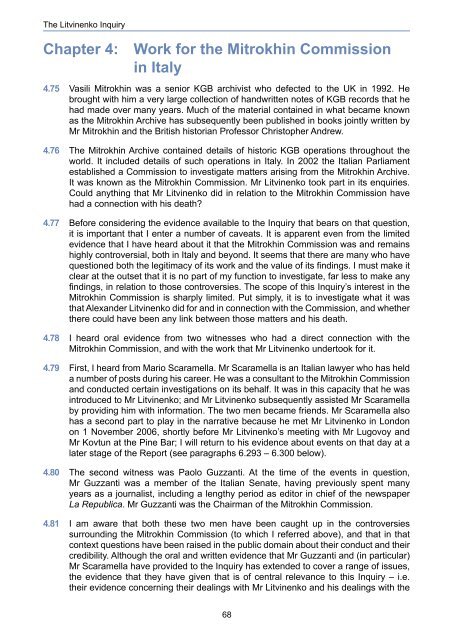The Litvinenko Inquiry
JIEp7Zyr
JIEp7Zyr
Create successful ePaper yourself
Turn your PDF publications into a flip-book with our unique Google optimized e-Paper software.
<strong>The</strong> <strong>Litvinenko</strong> <strong>Inquiry</strong><br />
Chapter 4: Work for the Mitrokhin Commission<br />
in Italy<br />
4.75 Vasili Mitrokhin was a senior KGB archivist who defected to the UK in 1992. He<br />
brought with him a very large collection of handwritten notes of KGB records that he<br />
had made over many years. Much of the material contained in what became known<br />
as the Mitrokhin Archive has subsequently been published in books jointly written by<br />
Mr Mitrokhin and the British historian Professor Christopher Andrew.<br />
4.76 <strong>The</strong> Mitrokhin Archive contained details of historic KGB operations throughout the<br />
world. It included details of such operations in Italy. In 2002 the Italian Parliament<br />
established a Commission to investigate matters arising from the Mitrokhin Archive.<br />
It was known as the Mitrokhin Commission. Mr <strong>Litvinenko</strong> took part in its enquiries.<br />
Could anything that Mr <strong>Litvinenko</strong> did in relation to the Mitrokhin Commission have<br />
had a connection with his death?<br />
4.77 Before considering the evidence available to the <strong>Inquiry</strong> that bears on that question,<br />
it is important that I enter a number of caveats. It is apparent even from the limited<br />
evidence that I have heard about it that the Mitrokhin Commission was and remains<br />
highly controversial, both in Italy and beyond. It seems that there are many who have<br />
questioned both the legitimacy of its work and the value of its findings. I must make it<br />
clear at the outset that it is no part of my function to investigate, far less to make any<br />
findings, in relation to those controversies. <strong>The</strong> scope of this <strong>Inquiry</strong>’s interest in the<br />
Mitrokhin Commission is sharply limited. Put simply, it is to investigate what it was<br />
that Alexander <strong>Litvinenko</strong> did for and in connection with the Commission, and whether<br />
there could have been any link between those matters and his death.<br />
4.78 I heard oral evidence from two witnesses who had a direct connection with the<br />
Mitrokhin Commission, and with the work that Mr <strong>Litvinenko</strong> undertook for it.<br />
4.79 First, I heard from Mario Scaramella. Mr Scaramella is an Italian lawyer who has held<br />
a number of posts during his career. He was a consultant to the Mitrokhin Commission<br />
and conducted certain investigations on its behalf. It was in this capacity that he was<br />
introduced to Mr <strong>Litvinenko</strong>; and Mr <strong>Litvinenko</strong> subsequently assisted Mr Scaramella<br />
by providing him with information. <strong>The</strong> two men became friends. Mr Scaramella also<br />
has a second part to play in the narrative because he met Mr <strong>Litvinenko</strong> in London<br />
on 1 November 2006, shortly before Mr <strong>Litvinenko</strong>’s meeting with Mr Lugovoy and<br />
Mr Kovtun at the Pine Bar; I will return to his evidence about events on that day at a<br />
later stage of the Report (see paragraphs 6.293 – 6.300 below).<br />
4.80 <strong>The</strong> second witness was Paolo Guzzanti. At the time of the events in question,<br />
Mr Guzzanti was a member of the Italian Senate, having previously spent many<br />
years as a journalist, including a lengthy period as editor in chief of the newspaper<br />
La Republica. Mr Guzzanti was the Chairman of the Mitrokhin Commission.<br />
4.81 I am aware that both these two men have been caught up in the controversies<br />
surrounding the Mitrokhin Commission (to which I referred above), and that in that<br />
context questions have been raised in the public domain about their conduct and their<br />
credibility. Although the oral and written evidence that Mr Guzzanti and (in particular)<br />
Mr Scaramella have provided to the <strong>Inquiry</strong> has extended to cover a range of issues,<br />
the evidence that they have given that is of central relevance to this <strong>Inquiry</strong> – i.e.<br />
their evidence concerning their dealings with Mr <strong>Litvinenko</strong> and his dealings with the<br />
68


